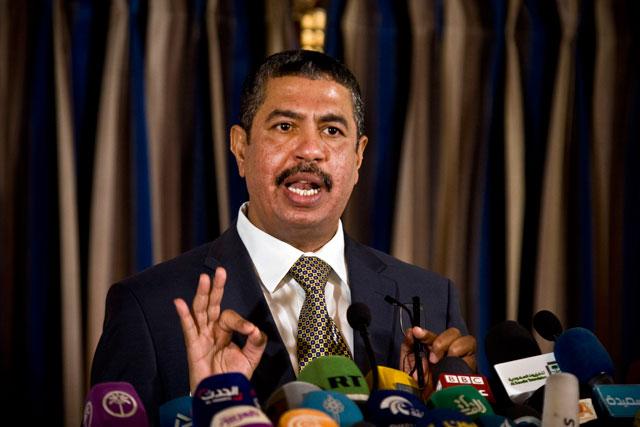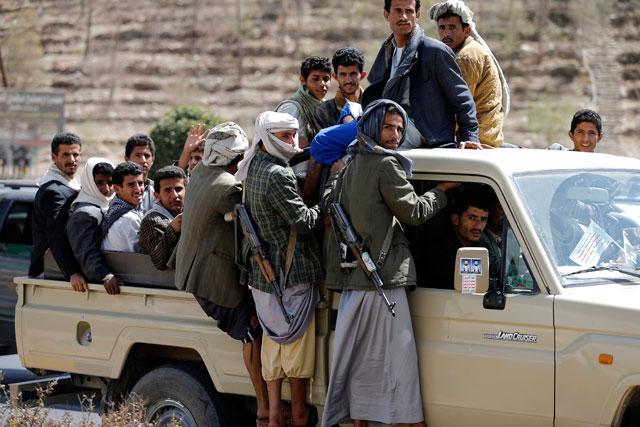You are here
Yemen crisis talks resume under shadow of walkout
By AFP - Feb 09,2015 - Last updated at Feb 09,2015
SANAA — Yemeni political factions resumed UN-brokered talks on Monday aimed at resolving the country’s political crisis but one group quickly walked out, underlining the difficult path ahead.
The Nasserite pan-Arab party left the talks saying it had been threatened by a powerful Shiite militia that grabbed power last week.
Saudi Arabia on Monday joined other countries in denouncing the militia, known as Houthis, for carrying out a “coup”.
Yemen, which is dominated by tribal divisions and awash with weapons, has been engulfed in crisis since veteran strongman Ali Abdullah Saleh was forced from power in 2012 following a bloody year-long uprising against his rule.
The country is also battling an Al Qaeda insurgency and facing a separatist movement in the formerly independent south.
The crisis escalated after the Houthis last month took control of key government buildings, prompting Western-backed President Abed Rabbo Mansour Hadi to tender his resignation.
The Houthis on Friday said they had dissolved parliament and created a “presidential council” to bring the country out of crisis.
UN envoy Jamal Benomar has warned Yemen is at a “crossroads” and urged political leaders to “take up their responsibilities and achieve consensus” as he battles for a negotiated solution.
But as the fresh talks got underway behind closed doors in a Sanaa hotel Monday, the Nasserite party walked out and vowed not to return.
“We will not return to the table of negotiations,” Nasserite party chief Abdullah Nooman told reporters.
He charged that the Houthis were insisting on holding talks based on the “constitutional declaration” under which they took over the government on Friday.
The Houthis have also “threatened to take measures” against the Nasserite party and Al Islah, a Sunni Islamist party whose supporters have battled the Shiite militia, he added.
The Houthis seized Sanaa in September after sweeping into the capital unopposed from their northern stronghold. Despite a UN-brokered deal, they have refused to withdraw their fighters from the city.
Time running out
Benomar, who announced the resumption of talks between the Houthis and Yemen’s fractured parties on Sunday, has warned that time is running out for a “peaceful solution”.
But militia leader Abdel Malek Al Houthi insisted at the weekend that the Houthis would only take part in talks centred on their consitutional declaration, and demanded that their rivals “rectify their policies”.
The government takeover by the Houthis has drawn international condemnation, with UN chief Ban Ki-moon calling on Sunday for Hadi to be restored to power.
“The situation is very, very seriously deteriorating, with the Houthis taking power and making this government vacuum. There must be restoration of legitimacy of President Hadi,” Ban said.
State news agency Saba, which is under Huthi control, reported that the president had told visitors his resignation is “irrevocable”.
Ban also voiced concern that Saleh, considered an ally of the Houthis, had “been undermining the transition process” in Yemen, although Saleh’s party has been among those denouncing the militia’s actions.
The Houthis have said they will set up a national council of 551 members to replace the legislature as well as a five-member presidential council that would form a transitional government to run Yemen for two years.
They have set up a security commission to run affairs until the presidential council is formed.
The fall of Hadi’s government has sparked fears that impoverished Yemen — strategically located next to oil-rich Saudi Arabia and on the key shipping route from the Suez Canal to the Gulf — could plunge into chaos.
The Saudi government, in a statement Monday, said the Huthi initiative was akin “to a coup against legitimate authorities”.
France meanwhile called on Yemeni politicians to quickly reach a “consensual solution to put end the crisis and push ahead with transition”.
Related Articles
Separatists from southern Yemen suspended their participation in UN-sponsored talks on the future of the crisis-hit country as nine soldiers were wounded Saturday in a clash with secessionist fighters.
Yemen's new Cabinet was sworn in on Sunday despite calls by former autocratic president Ali Abdullah Saleh and Shiite militias allied to him for it to be boycotted.
Yemen's dominant Shiite Muslim Houthi militia seized the offices of a political conciliation body late on Wednesday, hours after the president refused UN-brokered talks with their powerful movement unless they withdrew from Sanaa.
















